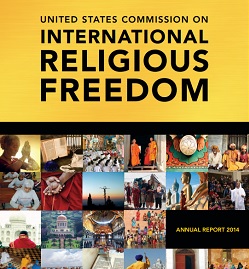Today the U.S. Commission in International Religious Freedom (USCIRF) released its 2014 Annual Report, and highlighted Bahrain as a country that should be the “focus of concern.” The section on Bahrain confirmed what many international organizations have been saying since the Bahraini government’s acceptance of the 2011 Bahrain Independent Commission of inquiry (BICI): that a continued lack of accountability for human rights abuses since 2011 remains pervasive.
A USCIRF delegation visited Bahrain earlier this year and witnessed firsthand the lack of progress on many of the BICI recommendations that the Bahraini government insists it has implemented, including the rebuilding of Shia places of worship destroyed in 2011. The report states specifically that “Based on the visit, USCIRF has concluded that while the Bahraini government has made some progress in implementing various BICI recommendations, it must act with greater urgency to redress past abuses and embrace genuine reforms. USCIRF remains concerned by the government’s continued lack of accountability for abuses against the Shi’a community since 2011…”
Other hard-hitting quotes from the Bahrain section of the report state that:
- “…the government still has not adequately held security officials accountable for the 2011 abuses and subsequent violations, which included harassing, imprisoning, torturing, and killing predominately Shi’a demonstrators.”
- “In 2013, Shi’a Muslims continued to be detained and arrested arbitrarily, including during Ashura commemorations in November. Incendiary, sectarian rhetoric continued in the government and pro-government media, new media laws that would curb anti-Shi’a incitement have not been passed, and little has been done to ensure the Shi’a community greater media access.”
USCIRF’s visit to Bahrain and subsequent assessment on the status of the rebuilding of Shi’a places of worship in the country undermines the Bahraini government’s claim that it has rebuilt the majority of the 30 sites destroyed in 2011 on its own dime, stating that “the delegation found that the Shi’a community itself had paid for and built six of the 10.”
The release of USCIRF’s annual report comes just a week after the United Nations Special Rapporteur on freedom of religion or belief admonished Bahrain for its persecution of a senior Shia religious figure in the country. Earlier this month, USCIRF Vice Chairs Katrina Lantos Swett and M. Zuhdi Jasser published an op-ed on Bahrain warning that Bahrain stands at a crossroads in which it must choose between “religious freedom and tolerance” which promotes stability and strength, or “discrimination and repression” which risks destabilization and strife.
There are very steps that the Government of Bahrain can take now to prevent a further sliding into instability and strife: hold those responsible for torture accountable at all levels of government, complete rebuilding the religious sites that were destroyed in 2011, and to embark on a genuine and meaningful reconciliation process with the opposition and the Shia community in the country. Taking these steps will not only help pull the country out of its current crisis, but will also help Bahrain live up to its own history of a being a country tolerant of all faiths.
–
Diala Jadallah is ADHRB’s Director of Advocacy





